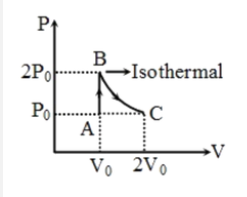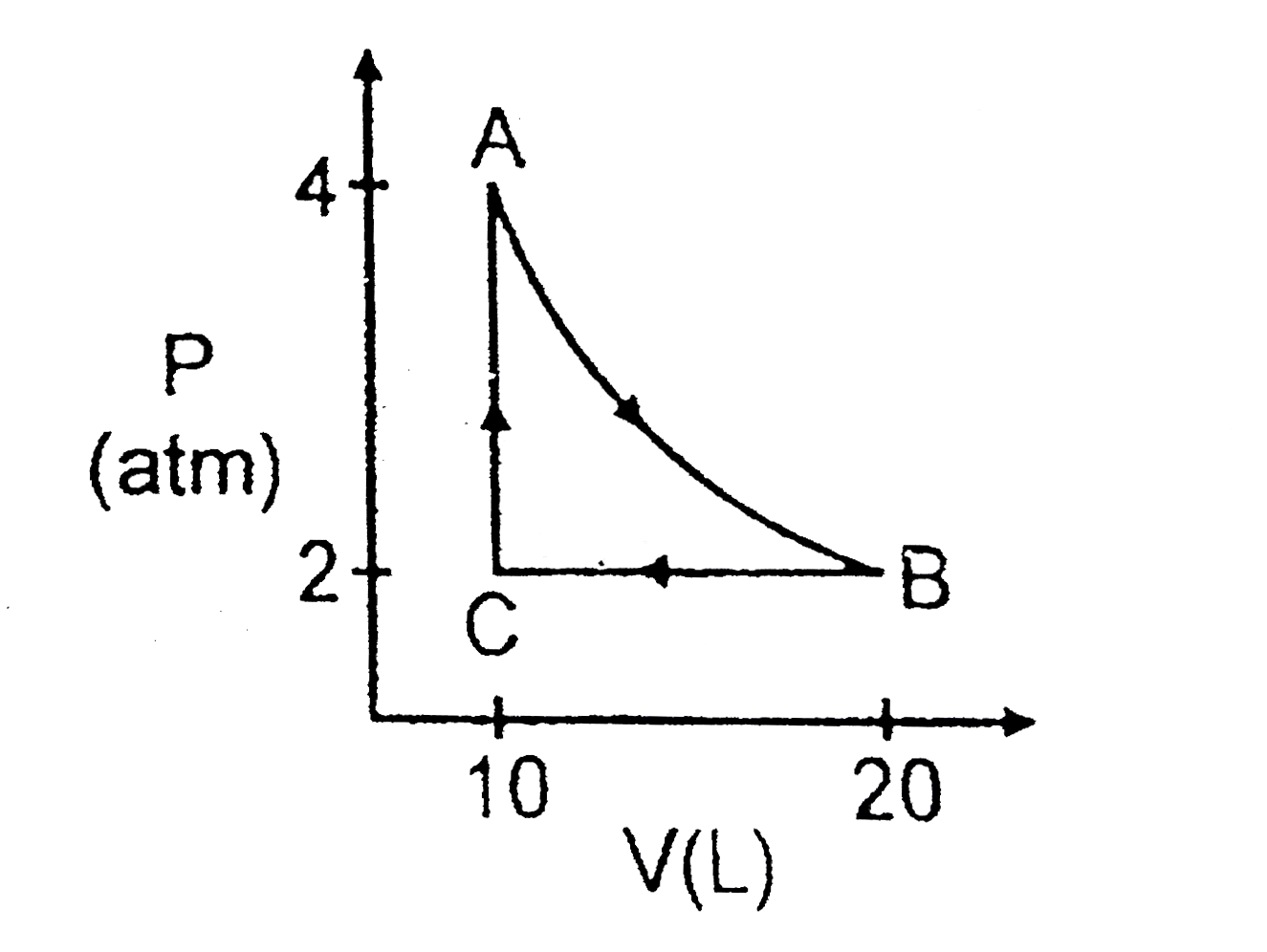A monatomic gas undergoes a thermodynamic process such that T∝V−27 (T = temperature and V = volume of the gas) As heat is supplied to the gas, choose INCORRECT option.
ms velocity of gas molecules increases
rms velocity of gas molecules decreases
work done on the gas is positive
density of the gas increases
The correct Answer is:B
To solve the problem, we start by analyzing the given relationship between temperature (T) and volume (V) for a monatomic gas undergoing a thermodynamic process, where T∝V−2/7.
1. Understanding the Relationship:
Given that T∝V−2/7, we can express this as:
T=k⋅V−2/7
where k is a constant.
2. Heat Supplied:
Since heat is being supplied to the gas, we know that the heat transfer Q>0. This implies that the temperature of the gas must increase.
3. RMS Velocity:
The root mean square (RMS) velocity of the gas molecules is given by:
Vrms=√3RTM
where R is the universal gas constant and M is the molar mass of the gas. Since R and M are constants, Vrms is directly proportional to the square root of the temperature T.
4. Effect of Temperature Increase:
As heat is supplied and the temperature T increases, the RMS velocity Vrms will also increase. This means that any option stating that the RMS velocity decreases is incorrect.
5. Analyzing Work Done:
For a polytropic process where PVx=constant, we can relate the work done on the gas. Here, we find x from the relationship:
PV9/7=constant
The work done on the gas can be expressed as:
W=nRΔT1−x
Substituting x=97:
W=nRΔT1−97=nRΔT−27(which is negative)
Thus, the work done by the gas is negative, indicating that work is done on the gas (positive work done on the gas).
6. Density Change:
The density ρ of the gas is given by:
ρ=mV
As the temperature increases, from the relationship T∝V−2/7, we can infer that the volume V must decrease. A decrease in volume while mass remains constant leads to an increase in density.
7. Conclusion:
Based on the analysis, the incorrect option is the one stating that the RMS velocity of gas molecules decreases, as we have established that it actually increases with an increase in temperature.
Final Answer:
The incorrect option is: RMS Velocity of Gas Molecule Decreases.
Given that T∝V−2/7, we can express this as:
T=k⋅V−2/7
where k is a constant.
Since heat is being supplied to the gas, we know that the heat transfer Q>0. This implies that the temperature of the gas must increase.
The root mean square (RMS) velocity of the gas molecules is given by:
Vrms=√3RTM
where R is the universal gas constant and M is the molar mass of the gas. Since R and M are constants, Vrms is directly proportional to the square root of the temperature T.
As heat is supplied and the temperature T increases, the RMS velocity Vrms will also increase. This means that any option stating that the RMS velocity decreases is incorrect.
For a polytropic process where PVx=constant, we can relate the work done on the gas. Here, we find x from the relationship:
PV9/7=constant
The work done on the gas can be expressed as:
W=nRΔT1−x
Substituting x=97:
W=nRΔT1−97=nRΔT−27(which is negative)
Thus, the work done by the gas is negative, indicating that work is done on the gas (positive work done on the gas).
The density ρ of the gas is given by:
ρ=mV
As the temperature increases, from the relationship T∝V−2/7, we can infer that the volume V must decrease. A decrease in volume while mass remains constant leads to an increase in density.
Based on the analysis, the incorrect option is the one stating that the RMS velocity of gas molecules decreases, as we have established that it actually increases with an increase in temperature.
The incorrect option is: RMS Velocity of Gas Molecule Decreases.
Topper's Solved these Questions
- PHYSICS PART2BOOK - FIITJEECHAPTER - PHYSICS PART2EXERCISE - Section (I) : Subjective
4 Videos
- PHYSICS PART2BOOK - FIITJEECHAPTER - PHYSICS PART2EXERCISE - Section (II) : MCQ
27 Videos
- PHYSICS PART-IIIBOOK - FIITJEECHAPTER - PHYSICS PART-IIIEXERCISE - NUMERICAL BASED QUESTIONS DECIMAL TYPE
11 Videos
- ROTATIONAL MECHANICSBOOK - FIITJEECHAPTER - ROTATIONAL MECHANICSEXERCISE - COMPREHENSION - IV
2 Videos
Similar Questions
One mole of a diatomic gas undergoes a thermodynamic process, whose process equation is P∝V2. The molar specific heat of the gas is
View SolutionAn ideal diatomic gas undergoes a thermodynamic process as shown in the P−V diagram. The process AB is isochoric while the process BC is isothermal. The total heat gain to the gas in the process is nearly (use ln2=0.7)

View Solution
Knowledge Check
One mole of a monoatomic ideal gas undergoes a thermodynamic process such thatV3T2= constant. Then,
Awork done by the gas is 200R when temperature of the gas is raised by 300 KBthe specific heat of the gas in the process is 136RCwork done by the gas is 300R when temperature of the gas maised by 600 KDthe specific heat of the gas in the process is 214 RA certain amount of an ideal monoatomic gas undergoes a thermodynamic process such that VT2= constat where V= volume of gas, T= temperature of gas. Then under process
AWhen heat is supplied to gas its temperature will increaseBthe coefficient of volume extension of gas equals −2TCThe molar heat capacity of gas is 2RDWhen heat is supplied to the gas its temperature decreases.An ideal gas is made to undergo a termodynamic process given by V∝T2 , find the molar heat capacity of the gas for the above process.
AR(γ−1)BγR(γ−1)C(2γ−1γ−1)RD(2γ−1γ+1)R
An ideal gas (γ=1.5) undergoes a thermodynamic process in which the temperature and pressure of the gas are related as T−1P2= constant. The molar heat capacity of the gas during the process is
View Solution1 mol of an ideal gas undergoes different thermodynamical process in P−V digram given below :

If temperature at point C is TK then :
View SolutionIn a process V∝T2, temperature of 2 moles of a gas is increased by 200K. Work done by the gas in this process will be
View SolutionTwo moles of an ideal mono-atomic gas undergoes a thermodynamic process in which the molar heat capacity 'C' of the gas depends on absolute temperature as C=RTT0, where R is gas consant and T0 is the initial temperature of the gas. (V0 is the initial of the gas). Then answer the following questions:
The equation of process is
View SolutionIf a monoatomic gas undergoes a thermodynamic proces for which its molar heat capacity is equal to the universal gas constant. What is the process in terms of V and T ?
View Solution
